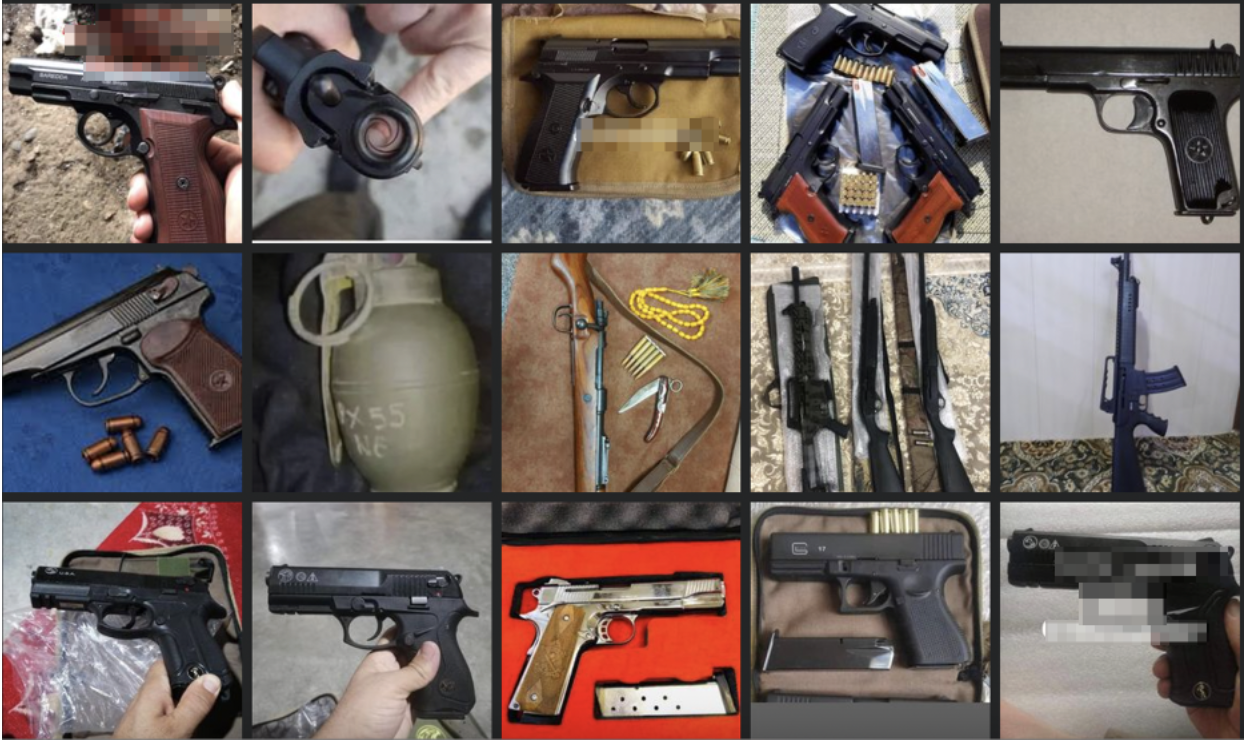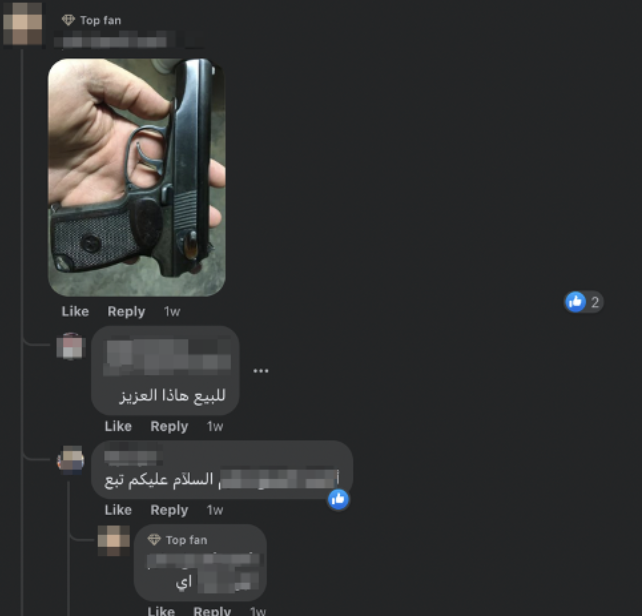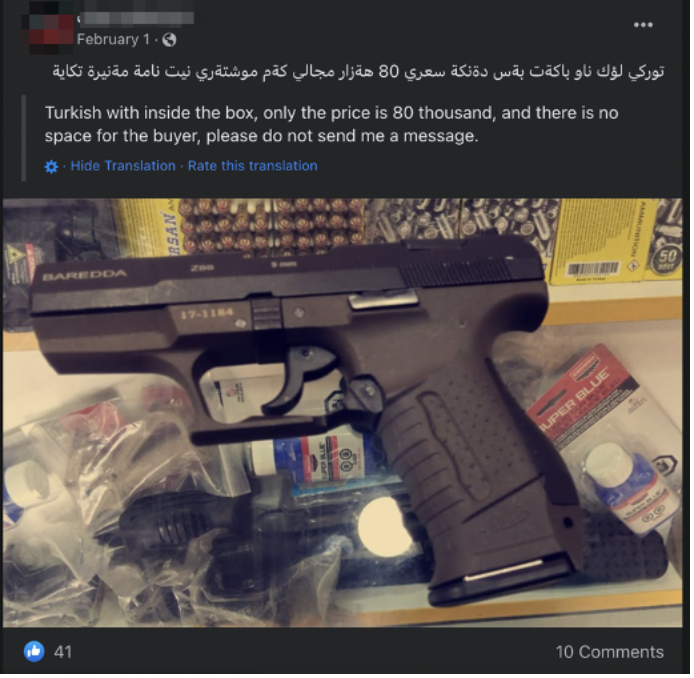Iraqi Gun Sales on Facebook: The Very Real Consequences of Moderation Failures
28 July 2022
By Moustafa Ayad
_________________________________________________________________________________
Late in June in Kurdistan, Aras Mahdi Qassim is alleged to have made his way to a Soran University lecturer’s home armed with a pistol he bought on Facebook. There, he chased and killed the lecturer’s husband. He then drove to Salaheddin University where he opened fire on a university guard and injured him, before killing the dean of the law department. Qassim was apparently “disgruntled” over being expelled from Soran University due to poor grades and wanted to transfer to Salaheddin.
While the world is fixated on horrific mass shootings and the proliferation of high-powered guns across the United States, in Iraq, citizens have access to more than 7.6 million firearms coursing throughout the country. Some of these are available for purchase on Facebook. In 2019, Iraq had a higher rate of violent gun deaths per capita than the United States, and the highest in the Middle East and North Africa, according to statistics from the University of Washington (conflict-related deaths were specifically left out).
The killings in Kurdistan not only highlighted this issue acutely, it led the government of the Kurdish-administered region to ban private gun sales and place harsh restrictions on weapons retailers. While Facebook claims that private sales of guns are strictly prohibited, the Washington Post revealed Facebook allows gun sellers 10 strikes before they are banned from using the platform.

A selection of weapons for sale in a Kurdish group that caters to gun enthusiasts.
This policy has real world implications, and nowhere are these implications felt more than in conflict and post-conflict zones such as Iraq. ISD identified large, gun enthusiast Facebook pages in Arabic and Kurdish administered out of Iraq, with comments sections strewn with adverts for pistols and rifles, and users leveraging public profiles as virtual showrooms for handgun sales. ISD has purposefully chosen not to name the pages and groups identified.
Four pages identified had a collective follower base of 2,225,761, with one explicitly noting that no gun sales were permitted. Followers frequently disregarded this rule in the comment sections of posts, flaunting weapons for sale. ISD also tracked one Kurdish group with just over 2,500 members, whose sole function was to sell weapons, bulletproof vests, and other military regalia. While several posts were just a means by which gun enthusiasts could share their guns with others, the comments under these posts often transformed into an open gun market.

A top fan in an Iraq-administered page indicated this pistol is for sale in response to other users’ requests for information.
The largest page in the dataset had more than 1.8 million followers and explicitly stated, “THIS FAN PAGE DOES NOT SELL ANY FIREARMS”. A review of comments on the page suggested that followers openly ignore this warning, openly selling weapons to each other for months. ISD found pistols, grenades, shotguns, and automatic weapons for sale.
A Kurdish-language group specialising in “military stuff,” which is administered by an account called “weapons for sale”, has 2,554 members. The page was selling grenades and 110 guns, including regional variations of AK-47s, between January – April 2022. Users often posted photos of the guns in the comments section to indicate the weapon was for sale. They conducted transactions with those interested either via phone numbers left in the comments section, numbers superimposed on the photograph of the weapon, or Facebook messenger.

A handgun for sale in a Kurdish Facebook group.
On another Arabic-language page, which has more than 340,000 followers and is administered out of Iraq, users posted Turkish shotguns and pistols, with some users asking for weapons “tomorrow” in the community section of the page. Sellers shared their phone numbers with potential buyers or invited them to discuss the sale on messenger. Turkish, South African, and sometimes American weapons were for sale on many of these pages. They were often unmoderated, and the brazenness of both sellers and buyers was on full display in the comments section.
Two of the pages and groups identified by ISD in this research have now been taken down by Meta. The rest are still live.
Internal Facebook documents from 2021 revealed that the company lacked the moderation capacity to deal with Arabic dialects such as Iraqi. This investigation demonstrates that users are apparently exploiting these existing moderation gaps. Gun sales in Iraqi spaces, both in Arabic and Kurdish, have been taking place for months, likely longer. Iraq is currently fighting several internal conflicts, one with the Islamic State and another with Iran-aligned militias who are a part of the political and military establishment and have targeted journalists and activists with assassinations. That Facebook cannot effectively monitor and moderate these spaces in an environment as volatile as Iraq is a clear failing of the company on several levels. Meta, however, does not face sustained advocacy around moderation in conflict zones.
In an Iraqi context, gun sales on Facebook are only one part of the overall online harms spectrum. Nonetheless, they come with very stark real-world implications, such as the fatal shooting of two scholars in Kurdistan with a gun allegedly bought on the platform. Unless the company takes the responsibility of moderating these spaces seriously, the potential for more violence is inevitable. Until there is better moderation, it won’t take 10 strikes before there are real world implications.



